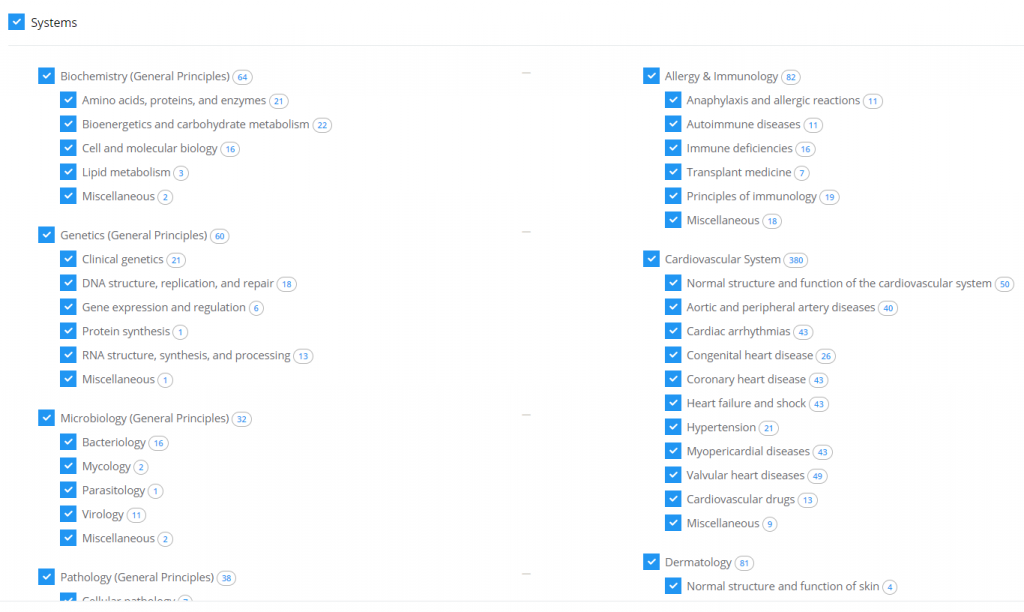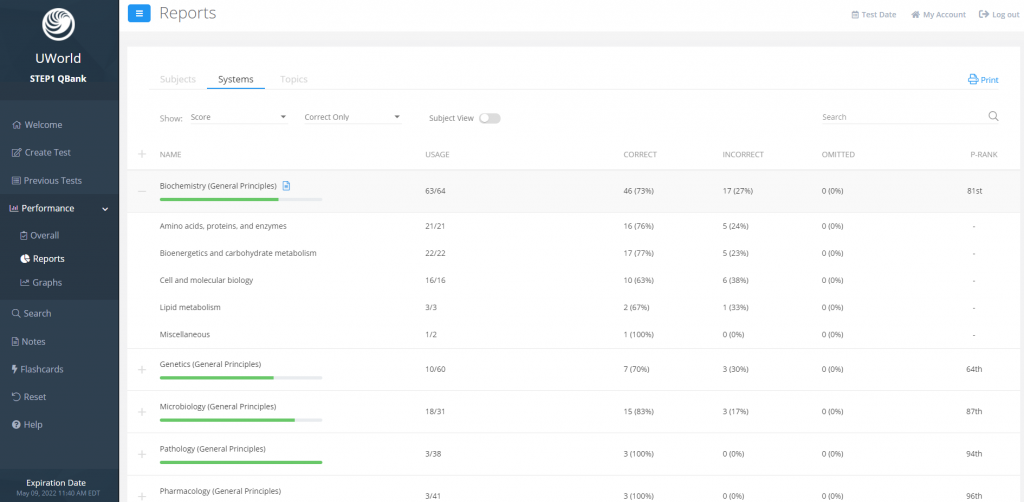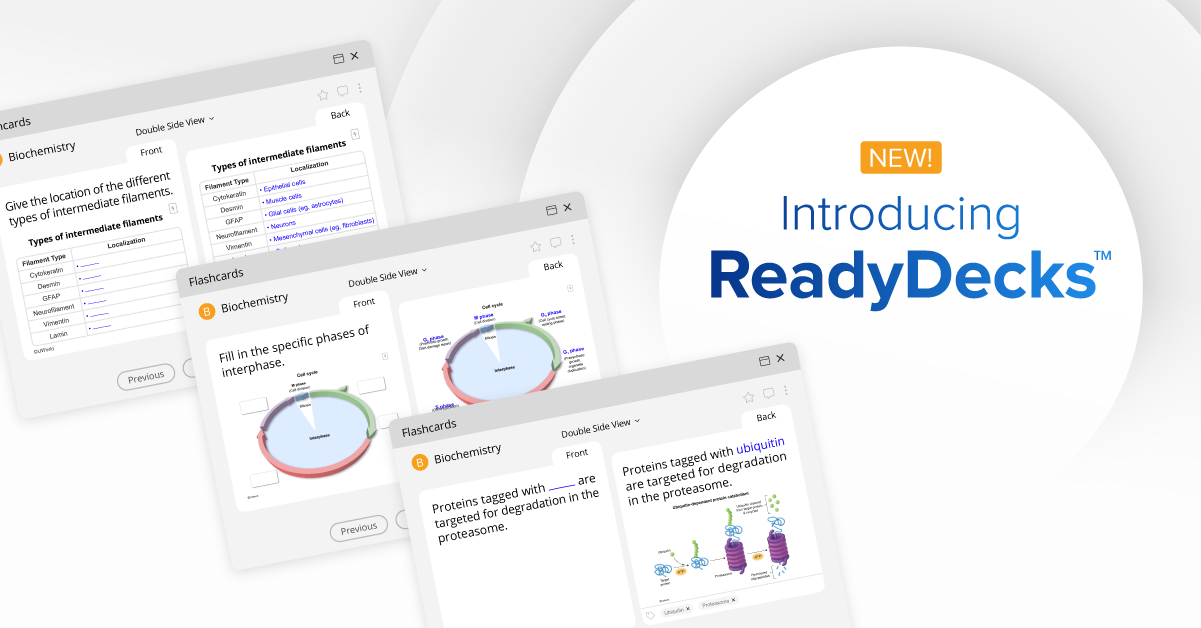Perhaps only a few things can trigger a catecholamine surge for medical students faster than the mention of the Step 1 exam. Even for those of us who have ostensibly moved on to life-after-the-exam, thinking about it can still put our amygdalae into overdrive. This autonomic response may seem exaggerated to those unfamiliar with the exam.
Still, there are good reasons why most medical students experience at least a little bit of fear when thinking about Step 1. The exam covers a massive amount of information, must be passed to obtain medical licensure, and often influences residency opportunities. Palpitations may coincide.
So how can you constructively deal with this fear? A healthy option is doing something productive with it, such as using it as a catalyst to prepare well. This article will discuss how you can use our new Step 1 Categories to improve your Step 1 preparation through sound strategy and an early start.
Getting Ahead by Starting Early
You can get a head start on Step 1 preparation by doing Step 1 practice questions throughout your preclinical years. This is easy to do if you systematically work through a question bank (QBank) such as the UWorld Step 1 QBank system by system (or subject by subject) alongside your medical school curriculum. With just a few questions each day, you can progressively master the basic sciences important to Step 1 (and your career) and hone your critical reasoning skills, long before Step 1 related hyperarousal leads to insomnia.
Practice questions also promote an active-learning approach to studying for your classroom exams. Unlike rereading the textbook or your notes, practice questions force you to actively (versus passively) recall important medical concepts and apply them to new scenarios, improving both concept integration and memory retention. When the practice questions you choose correspond to the subjects and systems you’re already learning in class, you’re killing two birds—preparation for classes and Step 1—with one stone.
Using Categories to Customize Your Practice Tests
With the recent introduction of Step 1 Categories, it’s now easier than ever to customize UWorld practice tests to complement your curriculum. When you create a test, you can expand each System (ie, click the + icon) to view its Categories:

Categories help you more intuitively find the questions that correspond to the material you just covered in class. For example, suppose you recently learned about immune deficiencies in Immunology class (eg, traditional curriculum) or case-based learning (eg, systems-based curriculum). In that case, you can select the “Immune deficiencies” category within the Allergy & Immunology system to review and reinforce what you’ve learned.
Using Categories to Analyze Your Performance
We’ve also added Categories to the Performance section of the QBank, allowing you to go deeper to determine your areas of strength and weakness:

This more detailed analysis provides valuable data that will help you triage your study time, both during your preparation for class exams and during your Step 1 dedicated study period.
Answers to Your Frequently Asked Questions
I’ve heard that UWorld’s questions are the best available resource for Step 1 practice. Doesn’t that mean I should save them for my Step 1 dedicated study period?
No, we think that would be far from optimal. Instead, why not use your best resource early, often, and repeatedly to solidify your basic science foundation as you’re building it?
Plus, you don’t want to wait until the last 4-6 weeks before the test (ie, dedicated study period) only to realize that the UWorld Step 1 QBank has over 3,200 questions (cue panic mode). Or to discover that the explanations are super helpful (those “aha!” moments), you don’t have time to read them thoroughly.
What if I want to repeat the practice questions just before taking my classroom exams? Do I have to reset the QBank?
No, you can use the practice questions as many times as you’d like without resetting the QBank; simply select “All” questions (Question Mode) when creating a practice test. Many students also benefit from specifically reviewing the questions they answered incorrectly (“Incorrect” in Question Mode) before their classroom exams.
We recommend resetting the QBank just before beginning your dedicated study period for Step 1. Resetting the QBank clears all your old performance statistics, so you get a clean slate for determining your percentage correct and the average amount of time you spend per question.
So, if I’ve already used all the questions alongside my school’s curriculum, what questions should I use during my dedicated study time?
We recommend a second pass through the UWorld QBank at that time—in other words, taking a 2-times-through approach but with a different mindset each time. During your first pass, you should focus on learning rather than performance (ie, it’s okay to get questions wrong so long as you learn from them).
In contrast, during your second pass, you should focus on performance and exam simulation. Rather than go system by system (as during the first pass alongside your curriculum), take 40-question practice tests on all subjects/systems to mimic the exam. In addition, focus on building both stamina (ie, doing multiple 40-question blocks on the same day) and speed (ie, answering questions in <90 seconds).
Give yourself the best chance to succeed when you prepare for Step 1 with the UWorld USMLE Step 1 QBank. We wish you the best of luck!




